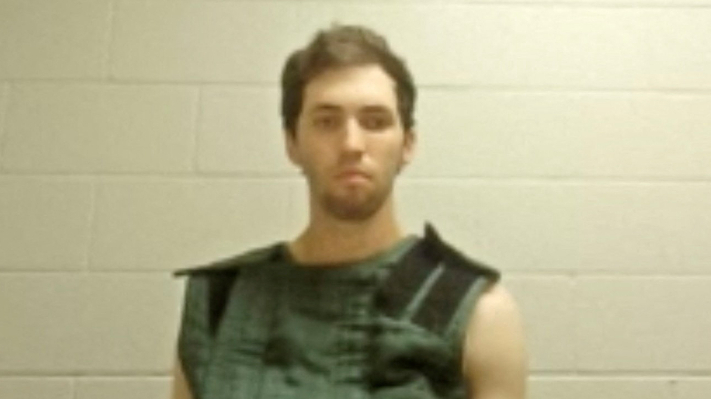Eight killed after Chinese tour bus plunges into frozen Lake Baikal
Divers have recovered the bodies of seven Chinese tourists and a Russian driver after their minibus broke through the ice of Lake Baikal in Russia, au...

Utah prosecutors said on Tuesday they will seek the death penalty for the suspect in conservative activist Charlie Kirk's assassination and revealed some of the evidence against him, including alleged text messages in which he appeared to confess to the crime.
"I had enough of his hatred," Tyler Robinson, 22, told his roommate and romantic partner when asked why he had committed the murder, according to transcripts of messages in court documents filed by prosecutors on Tuesday.
He is accused of firing the single rifle shot from a rooftop sniper's nest that pierced Kirk's neck last Wednesday on the campus of Utah Valley University in Orem, about 40 miles (65 km) south of Salt Lake City.
Utah County District Attorney Jeffrey Gray said at a press conference that his office had filed seven counts against Robinson on Tuesday, including aggravated murder, obstruction of justice for disposing of evidence and witness tampering for asking his roommate to delete texts implicating him.
Gray said he had made the decision to seek the death penalty "independently, based solely on the available evidence and circumstances and nature of the crime."
Some politicians, including U.S. President Donald Trump, had called for the death penalty in the case.
The defendant spoke only once, when asked to state his name. Utah District Court Judge Tony Graf said he would appoint a defence attorney to represent Robinson before the next court hearing, scheduled for 29 September.
On the day of the shooting, Robinson texted his roommate, the charging document said, telling him to look for a note under his keyboard.
When the roommate asked why he had shot Kirk, Robinson wrote, "I had enough of his hatred. Some hate can’t be negotiated out." He also said he had planned the attack for more than a week, prosecutors said.
In later text messages, Robinson said he wished he had gone back and grabbed the rifle that he left in a bush immediately following the killing, noting that it had belonged to his grandfather.
"I’m worried what my old man would do if I didn’t bring back grandpas rifle," he wrote. "I might have to abandon it and hope they don’t find prints."
DNA found on the trigger of what authorities believe was the murder weapon was linked to Robinson, prosecutors said.
Texts to roommate
Robinson turned himself in a day after the shooting, after his parents saw images of the gunman and confronted him, according to the filings. Robinson implied that he wanted to take his own life, but Robinson's parents were able to convince him to meet them at their home, where Robinson indicated that he was the shooter.
Robinson ultimately decided to surrender to police after speaking at his parents' urging with a family friend who is a retired deputy sheriff, prosecutors said.
"I'm much more worried about you," he wrote to the roommate after revealing he would turn himself in. He also urged the roommate to delete the messages and to refuse to speak with police or the media.
The roommate, who was not identified in court papers, is cooperating with authorities, officials have said.
Prosecutors have added aggravating factors to the murder and firearm charges because Robinson is believed to have targeted Kirk based on political views and knew that children would witness the killing, Gray said. Under state law, only aggravated murder can carry the death penalty.
Kirk, the 31-year-old co-founder of the conservative student movement Turning Point U.S. and a key Trump ally, was speaking at an event attended by 3,000 people when he was gunned down.
Quentin Griffiths, co-founder of online fashion retailer ASOS, has died in Pattaya, Thailand, after falling from the 17th floor of a condominium on 9 February, Thai police confirmed.
Ukraine’s National Paralympic Committee has announced it will boycott the opening ceremony of the Milano Cortina 2026 Paralympics in Verona on 6 March, citing the International Paralympic Committee’s decision to allow some Russian and Belarusian athletes to compete under their national flags.
Cubans are increasingly turning to solar power to keep businesses operating and basic household appliances running during prolonged electricity cuts, as fuel shortages make diesel generators and other temporary solutions more difficult and costly to maintain.
Eric Dane, the actor best known for his roles in 'Grey’s Anatomy' and 'Euphoria', died on Thursday, at the age of 53 after a battle with amyotrophic lateral sclerosis (ALS). His family confirmed his death after what they described as a “courageous battle” with ALS.
An Austrian climber has been convicted of gross negligent manslaughter after his girlfriend died from hypothermia while climbing Austria’s highest peak, the Grossglockner, in January 2025.
Divers have recovered the bodies of seven Chinese tourists and a Russian driver after their minibus broke through the ice of Lake Baikal in Russia, authorities said.
A technical fault in the helium system of NASA’s next-generation moon rocket was announced on Saturday, ruling out the planned March launch window for the Artemis II mission.
President Donald Trump said on Saturday (21 February) that he will raise temporary tariffs on nearly all U.S. imports from 10% to 15%, the maximum allowed under the law, after the Supreme Court struck down his previous tariff program.
Germany's ruling conservatives on Saturday (21 February) passed a motion to ban social media use for under 14s and introduce more stringent digital verification checks for teenagers, building momentum for such limits in Germany and elsewhere in Europe.
India and Brazil signed a mining and minerals cooperation pact on Saturday (21 February), as Prime Minister Narendra Modi said the two countries aim to increase bilateral trade to more than $20 billion within five years.
You can download the AnewZ application from Play Store and the App Store.

What is your opinion on this topic?
Leave the first comment